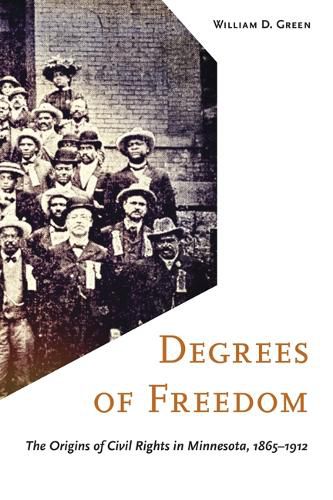Readings Newsletter
Become a Readings Member to make your shopping experience even easier.
Sign in or sign up for free!
You’re not far away from qualifying for FREE standard shipping within Australia
You’ve qualified for FREE standard shipping within Australia
The cart is loading…






The true story, and the black citizens, behind the evolution of racial equality in Minnesota
He had just given a rousing speech to a packed assembly in St. Paul, but Frederick Douglass, confidant to the Great Emancipator and conscience of the Republican Party, was denied a hotel room because he was black. This was Minnesota in 1873, four years after the state had approved black suffrage-a state where freedom meant being unshackled from slavery but not social restrictions, where equality meant access to the ballot but not to a restaurant downtown.
Spanning the half-century after the Civil War, Degrees of Freedom draws a rare picture of black experience in a northern state and of the nature of black discontent and action within a predominantly white, ostensibly progressive society. William D. Green reveals little-known historical characters among the black men and women who moved to Minnesota following the Fifteenth Amendment; worked as farmhands and laborers; built communities (such as Pig’s Eye Landing, later renamed St. Paul), businesses, and a newspaper (the Western Appeal); and embodied the slow but inexorable advancement of race relations in the state over time. Within this absorbing, often surprising, narrative we meet ordinary citizens, like former slave and early settler Jim Thompson and black barbers catering to a white clientele, but also personages of national stature, such as Frederick Douglass, Booker T. Washington, and W. E. B. Du Bois, all of whom championed civil rights in Minnesota. And we see how, in a state where racial prejudice and oppression wore a liberal mask, black settlers and entrepreneurs, politicians, and activists maneuvered within a restricted political arena to bring about real and lasting change.
$9.00 standard shipping within Australia
FREE standard shipping within Australia for orders over $100.00
Express & International shipping calculated at checkout
The true story, and the black citizens, behind the evolution of racial equality in Minnesota
He had just given a rousing speech to a packed assembly in St. Paul, but Frederick Douglass, confidant to the Great Emancipator and conscience of the Republican Party, was denied a hotel room because he was black. This was Minnesota in 1873, four years after the state had approved black suffrage-a state where freedom meant being unshackled from slavery but not social restrictions, where equality meant access to the ballot but not to a restaurant downtown.
Spanning the half-century after the Civil War, Degrees of Freedom draws a rare picture of black experience in a northern state and of the nature of black discontent and action within a predominantly white, ostensibly progressive society. William D. Green reveals little-known historical characters among the black men and women who moved to Minnesota following the Fifteenth Amendment; worked as farmhands and laborers; built communities (such as Pig’s Eye Landing, later renamed St. Paul), businesses, and a newspaper (the Western Appeal); and embodied the slow but inexorable advancement of race relations in the state over time. Within this absorbing, often surprising, narrative we meet ordinary citizens, like former slave and early settler Jim Thompson and black barbers catering to a white clientele, but also personages of national stature, such as Frederick Douglass, Booker T. Washington, and W. E. B. Du Bois, all of whom championed civil rights in Minnesota. And we see how, in a state where racial prejudice and oppression wore a liberal mask, black settlers and entrepreneurs, politicians, and activists maneuvered within a restricted political arena to bring about real and lasting change.